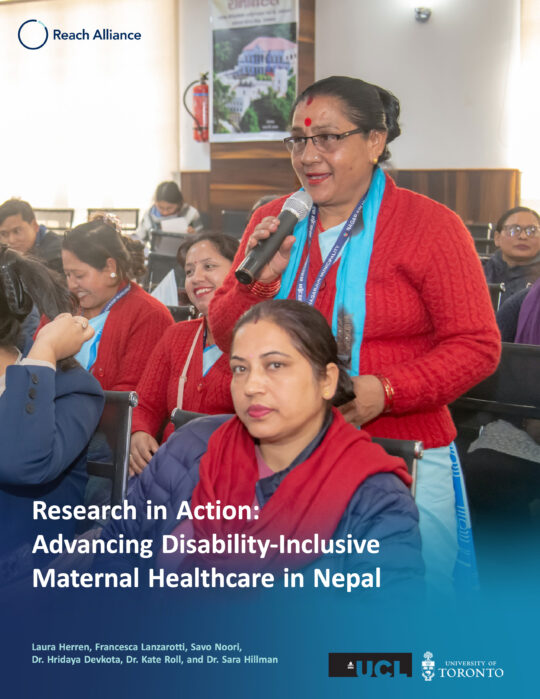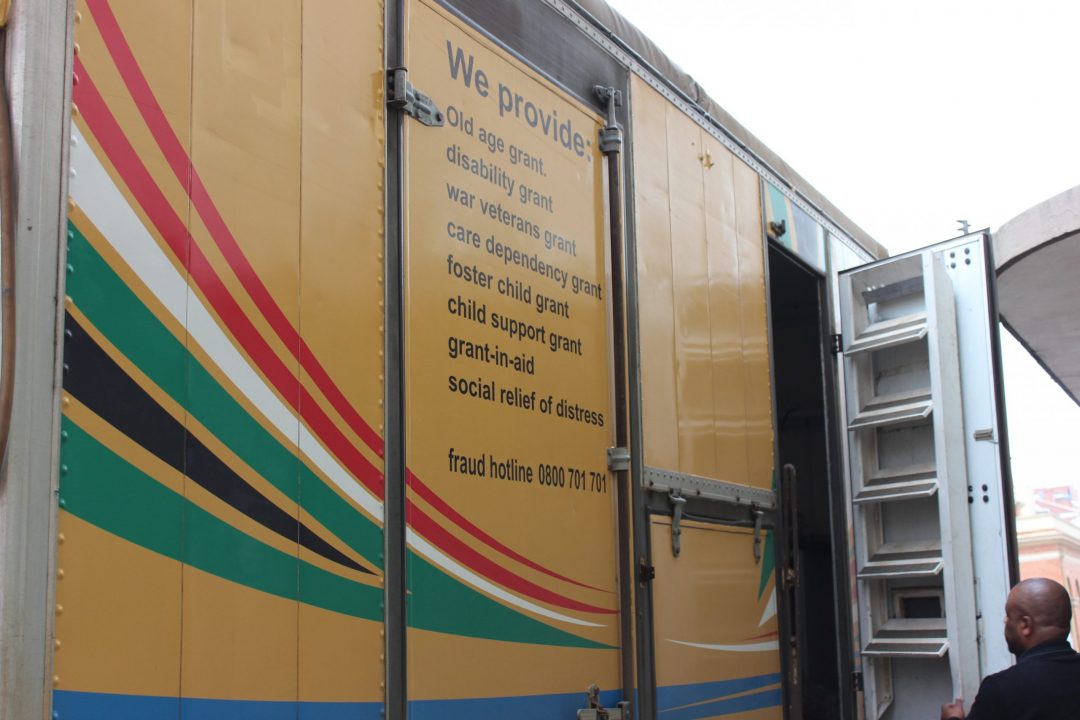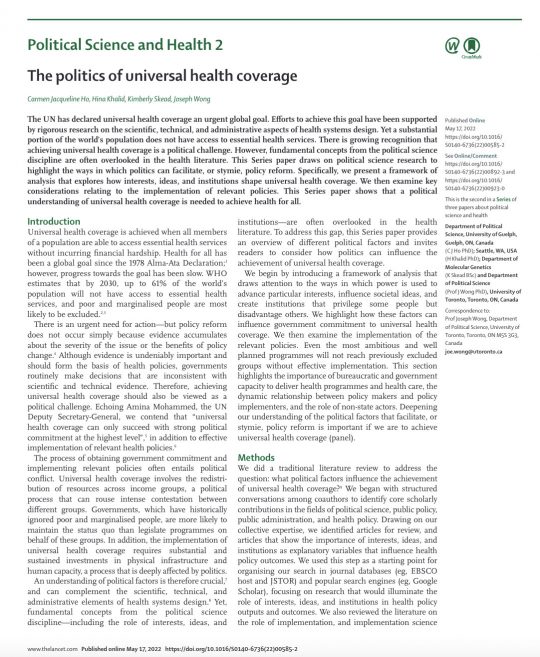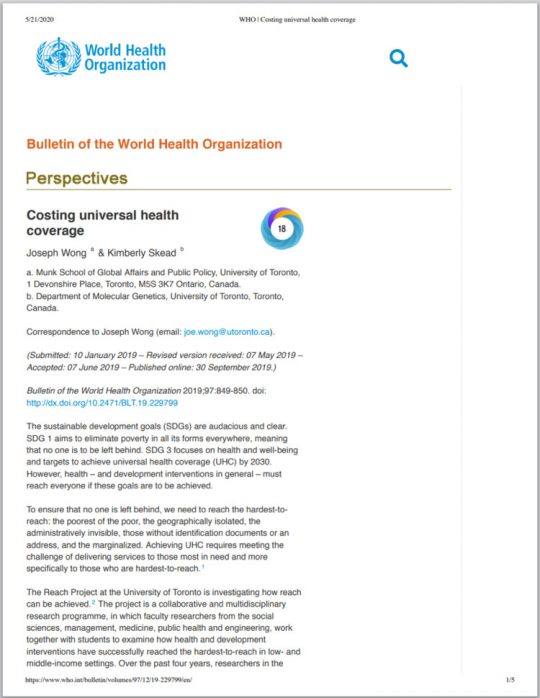Introduction
The 2015 Sustainable Development Goals (SDGs) are momentous, not only for their ambition but also their unequivocal clarity. SDG #1 declares the imperative of “ending poverty in all its forms everywhere.” A key mechanism for eliminating poverty is the guarantee that everyone has a form of legal identity. For instance, SDG 16.9 proclaims: “By 2030 provide legal identity for all, including birth registration.” South Africa is a success case when it comes to increasing birth registration. According to the 2013 UNICEF report, Every Child’s Birth Right, South Africa’s birth registration rate (inclusive of current and late registrations) increased from under 25% in 1991 to 95% in 2012. This increase in birth registration is a remarkable achievement given that a 95% registration rate is considered “universal.” South Africa’s commitment to ensuring that the births of newborns are registered demonstrates extraordinary will and capacity to reach those who are hardest to reach.
“Birth registration is a fundamental human right that can safeguard children from harm and exploitation.”
UNICEF
Source: UNICEF, 2013.
Scandal of Invisibility
As stipulated in the United Nations Convention on the Rights of the Child, all children have a right to a name, nationality and to have their birth officially registered. And yet, UNICEF reported in 2005 that nearly 50 million children born each year do not have their births registered. As of 2013, UNICEF estimates that nearly 230 million children under age five did not have their birth registered. Simply put, there is no official record of these births. It is estimated that nearly 190 million of these children live in Sub-Saharan Africa and South Asia, with these two regions accounting for 82% of all unregistered children. In India it is estimated that over 70 million children are unregistered. In low-income African countries such as Somalia, Liberia and Ethiopia only 3% to 7% of children are registered.
Many obstacles stand in the way of birth registration, to be sure. Poorer countries are more likely to have lower birth registration rates. And within these poor countries, marginalized ethnic and racial groups are particularly vulnerable. Poorer households also tend not to have their child’s birth registered. Those who are living in rural areas and who are otherwise geographically isolated have a higher chance of being excluded. Research also shows that the mother’s level of education is a reliable predictor of whether her child’s birth is registered; less well-educated mothers are less likely to have their child’s birth officially registered.
The implications of not having a child registered are manifold, all of them bearing potentially negative effects on a child’s development and future life chances. A child whose birth is not registered is very unlikely to have a birth certificate. Without a birth certificate, she does not enjoy any legal recognition, making it difficult for her to access health and education services. He cannot apply for a passport. And without any legal recognition, such children are especially vulnerable to exploitation, human trafficking and other human rights violations. UNICEF declares that birth registration “is a fundamental human right that can safeguard children from harm and exploitation.” That so many of the world’s children today do not enjoy this right to legal identity is, according to the Lancet, a “scandal of invisibility.”
“These [unregistered] children lack a key building block for legal identity, potentially precluding them from economic and social opportunities later in life such as participating in the modern economy, accessing public services, or registering to vote.”
Centre for Global Development
South Africa’s Success
Birth registration (including both current and late registrations) in South Africa increased from under 25% to 95% between 1991 and 2012. To achieve this remarkable improvement, South Africa has had to overcome several obstacles. For instance, the legacies of the apartheid system that stratified South African citizens according to race inhibited people’s trust – especially among Black South Africans – in any form of government registration, including birth registration. According to many we spoke with in South Africa, black South Africans were understandably reluctant to register their children’s birth for fear of the apartheid regime. Practical constraints mattered as well. The lack of access to official facilities to register a child’s birth, especially in remote and rural areas as well as poorer regions, needed to be addressed. There was inadequate infrastructure in place to reach those who are hard to reach. Furthermore, the lack of awareness surrounding the importance of birth registration and legal identity for children, notably among less educated mothers, was another obstacle to increasing birth registration in South Africa. And last, the challenges of bureaucratic coordination resulted in inefficient processes for birth registration. As a 2007 report from a South African NGO pointed out, in South Africa the birth registration process involved six different government ministries. Administrative processes needed to be streamlined.
Despite these extraordinary challenges, South Africa’s birth registration rate improved dramatically in a relatively short period of time. According to UNICEF, the birth registration rate increased from 24% in 1991, to 50% in 2000, 75% in 2005 and to 95% in 2012. This measure counts all registrations, including those that are current (within 30 days of birth), late (within one year) and others (beyond one year). Data from the government’s Stats South Africa bureau (StatsSA) reports a similar trajectory. During the 1980s, the birth registration rate (not including late registrations beyond one year) in South Africa was estimated to be around 25% of total live births. This increased to 37% in 1994, at the time apartheid ended in South Africa. By 2014, 86% of births were registered within one year of a child’s birth.
The boost to birth registrations came with an initially rapid increase in “late registrations” (within one year but over 30 days after birth). The number of “current registrations” (on-time registrations within 30 days after birth), on the other hand, did not increase markedly during the immediate post-apartheid period. However, the current birth registration rate increased rapidly after 1998. Around 2004, the number of current and late registrations intersected (see graph on next page), and thereafter late registrations decreased while the rate of current or on-time birth registrations continued to increase. These patterns are illuminating in that they reflect distinct efforts by the South African government to increase birth registration specifically and civil registration more generally.
South Africa has done a remarkable job of not only ensuring greater access for all South Africans to the birth registration process, but also raising awareness of the importance of registering the births of children. In short, the near-universalization of birth registration in South Africa is evidence of its success in reaching those who had previously been hard to reach.
Source: Statistics South Africa, 2014.
Registering Births in South Africa
Birth registration in South Africa is governed by Act 51, the Births and Deaths Registration Act, which was promulgated in 1992. The actual implementation of the birth registration process is carried out by the Department of Home Affairs (DHA). However, applying for an official birth certificate can involve several more government departments, including Home Affairs, Health, Education, Social Development as well as other local government offices.
Notwithstanding the many obstacles in the way of registering a child’s birth (i.e. distance to government office; access to health facilities; lack of awareness; inconsistent service) the actual process is quite straightforward.
When a child is born, an informant must declare the birth. If possible, the health facility or hospital at which the birth occurred can officially declare a child’s birth. Thereafter, the parent(s) or guardian(s) must notify the Department of Home Affairs (DHA) of the child’s birth. Completing the paperwork and submitting forms to the DHA office is the responsibility of the parent(s) or guardian(s). The DHA registers the child’s birth and can then issue a birth certificate. On-time or current birth registration must occur within 30 days of the child’s birth. Late registrations between 31 days to one year require additional documentation.
South Africa’s experience in increasing birth registration offers many lessons. Four key factors contributed to South Africa’s remarkable achievements. These are discussed in greater detail in this report.
- Beginning in the 1990s, soon after the end of apartheid, the government implemented measures to increase access to health facilities in rural areas in South Africa, with a specific focus on mother and child health (Section 2 of the Report);
- The introduction of the Child Support Grant (CSG) in 1998 created incentives for parents to register their child’s birth and obtain a birth certificate (Section 3);
- In order to address the challenges of ensuring birth registration processes and procedures reach those who live in rural areas or are geographically isolated, the central and provincial governments have introduced innovative outreach programs, including mobile units to reach those who are hard to reach (Section 4);
- Set against a history of racist apartheid policies, the introduction of democracy in South Africa transformed the idea of registration from one of surveillance to inclusive citizenship, fostering greater trust in government efforts to improve various civil registration processes (Section 5).
Despite South Africa’s success in increasing birth registration rates beginning in the 1990s, there remain several challenges and obstacles that need to be overcome if South Africa is to achieve universality in birth registration (Section 6). Though South Africa has been able to rapidly increase birth registration across large swathes of society, many continue to “fall through the cracks.” As one local expert-activist pointed out: South Africa’s current birth registration system has “hit the ceiling,” and if the remaining obstacles to registering a child’s birth are not fixed, “some people will never get there.” The Center for Global Development (2014) observes that “going the last mile can be difficult and costly, as countries need to cover excluded and marginalized groups that often have limited engagement with public institutions.”
Research
The following report on the evolution of the birth registration system in South Africa is the result of a year-long research project, carried out by Professor Joseph Wong of the Munk School of Global Affairs and the Department of Political Science at the University of Toronto, and five student researchers: Aditya Rau, Anthony Marchese, Kimberly Skead, Kourosh Houshmand, and Stephanie Lim. The research presented in this report was funded by the Canada Research Chairs program; the Ralph and Roz Halbert Professorship of Innovation at the Munk School of Global Affairs; and the MasterCard Center for Inclusive Growth. Research was conducted from September 2015 through July 2016, including primary fieldwork in South Africa in June 2016. Interviews and sites visits were conducted in Cape Town, Johannesburg, Pretoria, Stellenbosch and rural towns in Western Cape province and Kwazulu-Natal.
The authors of this report would like to express our gratitude and appreciation to those we met and interviewed in South Africa, specifically those in government, the health services field, legal activists, social movement leaders, scholars, and all of the other inspiring people who are together transforming South Africa’s birth registration system.
This research project, including fieldwork, was vetted by the Ethics Review Board of the University of Toronto.
This report is the second of several focusing on the concept of development reach; specifically innovative programs that are reaching the hardest to reach populations. Our first report (March, 2016) on Brazil’s Bolsa Familia Program can be retrieved here:
Health Access
Birth registration is an integral part of the health system. Prior to the end of apartheid, the public health system in South Africa was severely underdeveloped. A priority in the post-apartheid ANC government’s Reconstruction and Development Program, the health care system was improved to address (and redress) the socio-economic consequences of the discriminatory apartheid-era policies. Child health was and remains a key focus. For example, the Department of Health began issuing the Road To Health booklets to ensure all children’s health and development milestones are carefully tracked and documented by health professionals. The booklets record information such as the child’s health progress, physical development, immunization records and weight. The Road To Health booklets also provide parents and guardians important health promotion advice, especially regarding diet and nutrition. Every child who is born is supposed to receive a booklet, distributed by the health authorities free of charge.
Increasing Access
This booklet must be issued at birth by the health services concerned. If birth takes place at home, the first opportunity after delivery should be used to issue the booklet. The booklet must be issued FREE OF CHARGE, irrespective of delivery taking place at a public or private health facility.
Increasing birth registration in South Africa is a result of increasing access to the health system. In 1994 health care user fees were eliminated for pregnant women and children under the age of five. This was followed by the elimination of user fees in all health facilities in 1996. The elimination of user fees had a positive impact on health access, as the vast majority of black South Africans had previously identified user fees as being a major obstacle to accessing the health system. Over the course of the Mandela administration, the government oversaw the construction of 1300 new health facilities in South Africa.
During the 1990s and into the 2000s, participation by mothers in antenatal and postnatal programs grew considerably. Most strikingly, the number of birth deliveries in health facilities (“institutional deliveries”) increased dramatically over this period. According to the South Africa Demographic and Health Survey (SADHS) and UNICEF, during the early 1990s only 78% of births took place in health facilities; by 2008, however, nearly 95% of all deliveries took place in health facilities and were attended by a health professional. As expected, the rate of institutional deliveries in rural areas has lagged behind the rate of institutional deliveries in urban areas. Nonetheless, institutional deliveries in rural areas increased considerably from 74% to 89% between 1998 and 2003, corresponding with the rapid increase in birth registration rates beginning in 1998 (see Section 1 of report).
Integrating Birth Registration
Beginning in 1996, the National Health Information System for South Africa (NHIS/SA) led an initiative to integrate the birth registration process into the health care delivery system by implementing registration points in health facilities. Though gaps in service remain, the integrated registration process was scaled-up nationally. Further, in 2004 an online birth registration scheme was piloted in three hospitals in KwaZulu-Natal in an effort to directly integrate the birth registration process with birth delivery. The online scheme has since been scaled to nearly 400 health facilities across the country. The NHIS/SA also trained health practitioners and other front-line professionals to assist new mothers in filling-out birth registration forms after their child is born. Antenatal programs have also been revamped to include information about the benefits, procedures and requirements of birth registration. Postnatal programs, such as the distribution of the Road To Health booklets and follow-up immunization procedures, similarly highlight the importance of birth registration and encourage on-time registration. Integrating registration points and birth registration procedures within health facilities and the antenatal and postnatal programs has reduced previous barriers to birth registration, such as transportation costs and other opportunity costs incurred when families had to separately register their child’s birth at a Department of Home Affairs (DHA) office.
Mom Connect is a postnatal program that features mobile text messages to mothers about postnatal care for both mother and child, including information on their child’s vital signs, HIV, and children’s nutritional and developmental milestones. Mom Connect is an example of how simple interventions and existing technologies can provide important health information.
Increasing Awareness
UNICEF reports that one of the major obstacles to birth registration is the lack of awareness among parents and guardians of the benefits of birth registration, especially among less well-educated mothers. This was also the case in South Africa. Parents and guardians were often unaware of the longer-term benefits of birth registration (and a birth certificate). Considerable confusion among mothers and health professionals about the birth registration process was a hindrance as well. With the NHIS/SA in the lead, several government departments – including Health, Statistics South Africa, the Medical Research Council and Home Affairs – collaborated expressly to increase awareness among both new parents and health professionals about birth registration and its benefits.
The NHIS/SA established birth registration committees in various levels of government, from the national federal government to local administrations. The committees comprised government officials, civil society organizations and community leaders who together launched a series of campaigns and grassroots initiatives to promote the benefits of birth registration and to clarify the registration process. Reflecting local contexts, the committees launched a variety of initiatives, including town meetings, workshops and media (i.e. radio) campaigns. The NHIS/SA also encouraged collaboration among committees to facilitate learning best practices. The Villages and Townships Vital Registration Network, for instance, produces a bi-monthly newsletter in which government and civil society organizations share their local experiences.
Summary
Efforts by the South African government to increase access to health facilities, especially among poor and rural households, have had a positive effect on birth registration. Specifically, the removal of point-of-care user fees, increasing institutional deliveries, integrating the birth registration process into health facilities, and strengthening antenatal and postnatal programs have increased awareness among families of the benefits of birth registration and simplified the birth registration process.
Though efforts have been made to increase the number of health facilities, the lack of physicians and the distance from health care facilities remain problems in South Africa. Nearly 45% of South Africans live in rural areas, though only 12% of physicians work there. To be sure, a major problem in the South African health care system is a lack of physicians – only 0.57 physicians per 1000 persons. This challenge is even more severe in rural areas. The Ukwanda Rural Clinic School, part of the Stellenbosch University Medical School, seeks to address this problem. The clinic aims to generate interest among medical students to practice in rural areas upon finishing their training, especially students who themselves have rural backgrounds. The Rural Clinic School was established in 2011. Approximately 10% of medical students at Stellenbosch University participate in a year-long practicum at rural clinics, such as the Avian Park Clinic in Worcester (pictured here).
Child Support Grant
South Africa’s birth registration rate rapidly increased after 1998. Both the number of current and late registrations grew significantly. Nineteen ninety-eight was also the year during which the South African government implemented the Child Support Grant scheme, access to which required eligible households produce their child’s birth certificate. To have a birth certificate meant that the child’s birth was registered with the Department of Home Affairs (DHA). Thus, the Child Support Grant created an important incentive for birth registration
What is the Child Support Grant?
Prior to the introduction of the Child Support Grant, South Africa’s child support regime comprised a patchwork of apartheid-era social protection schemes such as the Care Dependency Grant and the State Maintenance Grant. These grants initially excluded black South Africans and were only slowly expanded over time. The Lund Committee of Enquiry into Child and Family Support was established in 1995 to examine social policy reforms aimed at supporting children’s health and development. The Committee was explicitly tasked with expanding the State Maintenance Grant, and providing policy advice on the creation of a more inclusive scheme to support children, especially those in poor households. A renewed program had to reach those children who had effectively been left behind. The Lund Committee initially recommended the creation of a universal benefit scheme. This scheme would eventually become the means-tested unconditional cash transfer known as the Child Support Grant.
What was once a four�step process involving the hospital, clinic, the Department of Home Affairs and then the Department of Social Development’s SASSA has become a two-step process, thus making it much simpler to both register a child’s birth and apply for the Child Support Grant.
The Child Support Grant was implemented in 1998. The program is managed by the South Africa Social Security Agency (SASSA) of the Department of Social Development (DSD). The DSD is a separate department from the Department of Home Affairs that oversees South Africa’s birth registration procedures. The Child Support Grant is an unconditional cash transfer, meaning recipient households do not have to meet any conditionalities (i.e. health and education conditions) to receive the grant. When the grant was introduced in 1998, the monthly transfer to eligible families was R100 (just over $7 US at current exchange rates). The transfer was increased to over R300 (approximately $22 US) by the 2000s. The Child Support Grant is not universal but rather means�tested, extended to those families whose household incomes fall below the government-set income threshold. Initially the income threshold for urban households was R800 (approximately $60 US at current exchange rates) and R1100 ($80 US) for rural families. The income threshold is currently set at ten-times the value of the grant. As of April 2015 the grant is R330 per month ($24 US), and thus the income threshold is R3300 per month for single caregiver households and R6600 for families with two parents (or guardians).
In the past, the grant was paid as a cash transfer, making it difficult for recipients to claim the monthly grant if they were unable to access a SASSA office. Fraud was also common in the cash transfer system. Currently, the SASSA transfers the monthly support grant with the SASSA financial services card. The chip card, which contains recipients’ biometric information, has essentially digitized the previously cash-based transfer scheme, making the payment of support grants much more secure and convenient. Transfers can be withdrawn at ATMs and grocery stores. Illiterate recipients are able to use biometric pads at the cashpoint to access the grant. From the point of view of the SASSA, the digitized system has contributed to decreasing cash fraud while increasing access to transfers for eligible families.
The impact of the Child Support Grant has been enormous. As of March 2015, a monthly grant of R330 was paid to households of close to 12 million children (aged 0 to 17 years). Extensive research shows the grant has had a positive impact on child health and development, including improved food security and nutrition; access to health services; and access to early childhood care and education. The Child Support Grant is also associated with reductions in the likelihood of child labor. The grant is credited with having a positive impact on improving gender equality.
Impact on Birth Registration
In order to receive the Child Support Grant, applicants must not only demonstrate that they are below the income threshold, they must also present official identification for the parent(s) and/or guardian(s) as well as the child’s birth certificate. In South Africa, a child’s birth must be registered before an application for a birth certificate can be made. Simply put, the implementation of the Child Support Grant system in 1998 introduced an incentive for parents to register their child’s birth. To be sure, research in South Africa and in other late developing countries shows that one of the most important determinants of a family’s access to any child grant scheme is whether or not the family has the official documentation required by the program.
In other words, to apply for the Child Support Grant requires families to register the birth of their child. Furthermore, because the Support Grant is available for children under the age of one, parents or guardians are incentivized to register their child’s birth soon after they are born (i.e. within 30 days, or current registration).
The empirical evidence confirms that the introduction of the Child Support Grant was related to improvements in birth registration, and that improvements to the birth registration process had a positive impact on the take-up rate of the Child Support Grant.
Birth registration rates increased significantly after the introduction of the Child Support Grant in 1998. Between 1998 and 2003, for instance, the total number of births registered grew by over 400,000 per year. Notably, late registrations increased most rapidly during the period immediately after the Support Grant was implemented, suggesting parents that had not registered their child’s birth on-time were seeking late registration in order to qualify for the Child Support Grant.
To facilitate both the birth registration process and the application to the Support Grant scheme, efforts have been made to integrate and hence streamline the two processes. In some hospitals and health facilities, for instance, birth registration and the issuance of a birth certificate take place within the one facility. Proposals are being considered to integrate the birth registration and Child Support Grant application processes within health facilities. In the past the Department of Home Affairs (in charge of birth registration) and the Department of Social Development (which manages the Child Support Grant scheme) functioned – and often located – separately. However, efforts to bring the two offices closer together and their functions in alignment have mitigated some of the obstacles to birth registration and the application to the Grant scheme. As one report put it, closer integration of DHA and DSD offices and their functions, “makes it much easier and quicker for eligible mothers to apply for the Child Support Grant. A four-step process involving visits to a hospital [for the birth], a clinic [for an immunization card], Home Affairs [for a birth certificate] and SASSA [to apply for a grant] has become a two-step process – from the hospital direct to the SASSA office, often within a few days of birth.”
Summary
The introduction of the Child Support Grant in 1998, an unconditional cash transfer scheme for eligible families, created an incentive for families to ensure the registration of their child’s birth. The Child Support Grant has proven to be a very effective program to support children’s health and development. Applicants to the Grant must present the child’s birth certificate, which requires that child’s birth to have been registered. After the implementation of the Child Support Grant, South Africa’s birth registration rate, including both current and late registrations, increased significantly.
The Robertson Thusong Centre is located in a more rural area of the Western Cape province, approximately a three-hour drive from Cape Town. The Thusong Centre is part of the government’s outreach efforts, to ensure essential social services reach those who live far from major urban centers. The Robertson Centre primarily serves farms and agricultural workers. It is essentially a one-stop centre, providing access to key government agencies and departments, including the Department of Home Affairs, the SASSA office of the Department of Social Development, and other departments such as Housing, Agriculture and voter registration. The Centre services approximately 300 people each day.
Active Reach
Consider the following: For many poor families in hard to reach places, it is very expensive to get to a Department of Home Affairs (DHA) office to register a child’s birth and to the SASSA (South Africa Social Security Agency) office in the Department of the Social Development (DSD) to apply for the Child Support Grant. For those living in distant areas, the offices are far away. Lost wages pose significant opportunity costs as some family members may need to take time off work to travel. And in some cases, many families may not even be aware that birth registration is required for access to important social services for their children, or that the Child Support Grant exists. The fact of the matter is that many people living in rural and otherwise inaccessible areas in South Africa are simply not reached.
Mobile Outreach
The South African government has expended tremendous effort to actively reach those who are hard to reach, creating several mobile programs that essentially bring social services – including birth registration – to children and their families living far from urban centers. In general, outreach programs share three characteristics. First, outreach programs are multifunctional, involving many different government agencies and departments. In this way, outreach programs play an integrative role by bringing together multiple services such as birth registration (managed by the DHA) and the Child Support Grant (run by the DSD). Second, outreach programs emphasize localization. South Africa is a diverse country and the characteristics of poverty are equally diverse; race, income, rural or urban residence, and gender, among other socio-economic characteristics, reflect different kinds of poverty, vulnerability and marginalization. Outreach strategies must therefore reflect local contexts and address the specific needs of a particular community. And third, mobile outreach programs are intent on raising awareness among isolated communities about the benefits of various social service programs, including birth registration.
ICROP
The Integrated Community Registration Outreach Programme (ICROP) is an initiative that organizes mobile provision of social services to South Africans living in less accessible areas. The ICROP was created in 2007 by the Department of Social Development’s SASSA to address obstacles to effective social service delivery, specifically: reaching poor rural dwellers; the challenges of geographical isolation; very complicated application and registration processes; as well as long, and often unpredictable, waiting times. Other costs that needed to be addressed included the cost of transportation to and from government offices and the opportunity cost of lost time and wages.
The ICROP targets its service delivery to the most rural areas in South Africa, especially those regions where the multidimensional poverty index – calculated by Stats South Africa, accounting for household income, health and education – has identified the most impoverished populations. The ICROP sends out mobile units to hold ICROP events, during which social services and information about social programs are brought to hard to reach communities.
Though the SASSA is the lead government agency managing the outreach program and organizing ICROP events, the ICROP platform is in fact shared by several governmental agencies and departments including Health, Education and Home Affairs. Social services delivered by the ICROP are integrated, in that registration into one program facilitates registration into others: birth registration, birth certificates, child support grants, registration for schools, access to health service and so on. In addition, ICROP organizers work closely with community leaders, local non-governmental organizations and religious groups to help promote ICROP events and to generate feedback from the communities being reached.
Active reach does not adhere to a one�size-fits-all model of delivery.
In 2007, the ICROP purchased 40 mobile units (trucks) that were distributed across all nine provinces. The distribution of the mobile units was informed by the multidimensional poverty index and targeted those regions most in need of ICROP mobile services.
The mobile trucks initially survey specific communities to identify their particular needs and to promote the ICROP service and upcoming ICROP events. The mobile unit is staffed by SASSA personnel along with staff from other departments; in this regard, the ICROP provides a one-stop social services delivery point. The ICROP mobile units are equipped with internet connectivity, providing integrated services from birth registration to the distribution of birth certificates to submitting applications for various SASSA grants. To ensure that citizens are not excluded, communication is conducted in local languages. A typical ICROP event can attract up to 500 new registrants.
A key characteristic of the ICROP is that while it is a nationally funded program, the actual implementation and operation of the ICROP and its outreach events take place at the provincial level. The decentralized implementation of the ICROP allows provinces to tailor their outreach programs to the needs of particular communities. We learned, for instance, that in Gauteng, mobile units were used to reach families in rural areas of the province and semi-urban townships where social service delivery is ineffective. In Kwa-Zulu Natal, however, where most of the population lives in the countryside, the ICROP programs are tailored specifically to rural communities. Meanwhile, in the much more developed Western Cape province, mobile units are not employed at all, and instead the ICROP uses existing community centres to deliver integrated social services. According to ICROP officials in Western Cape, we were told, the costs of maintaining mobile units are too high and the local SASSA office is able to deliver social services through networks of community centres effectively and efficiently.
Thusong
The Thusong program is similar to the ICROP in that it delivers social services to those who live in distant places and who are hard to reach. The first Thusong events were introduced in 1999, when the Thusong program organized social service delivery “jamborees.” The jamborees were intended to address the massive backlog of applications for birth certificates and various support grants, including the Child Support Grant. The service delivery programs were subsequently extended throughout the country. Currently there are 185 Thusong centres in South Africa.
The Thusong program is a nationally mandated program, though funding comes from the provincial governments. In this regard, the Thusong program is different from the ICROP; whereas the Thusong program operates with an “unfunded national mandate,” the ICROP receives central government funding from the Department of Social Development (DSD). This also means that when it comes to Thusong initiatives, the provinces and municipalities have a great deal of autonomy and latitude to design Thusong programs to fit their specific contexts. For example, in more developed provinces such as the Western Cape and Gauteng, the Thusong programs feature more permanent Thusong centres, while in poorer and more rural provinces, Thusong programs tend to rely more on mobile units. Active reach does not adhere to a one-size-fits-all model.
The Thusong program is organized as a hub-and-spoke model of social service delivery. The Thusong centre hubs – typically permanent bricks-and-mortar buildings – are in areas with the greatest need for service delivery and where the Thusong centre can have the largest impact. Thusong centre hubs are usually located in more densely populated regions. Like the ICROP, most Thusong centres are integrated one-stop delivery points for service provision from various government departments. Typically, families can register their child’s birth, apply for and receive a birth certificate, and apply for the Child Support Grant at the centre. Thusong centres provide other services as well, resembling community centres. The Worcester Thusong Centre, for example, runs after�school programs for local children and has internet-connected computers for public use.
Beyond the hub, the Thusong program operates “satellite centres” to periodically provide services for those living more than 25 kilometers away from the central hub. Satellite centres are temporary in that government departments will operate in the satellite centres regularly but periodically. Whereas permanent Thusong centres may be open for the entire week, satellite centres might offer services only once per week.
Thusong centres in the Western Cape run the “Cape Access” program, a provincial initiative to provide free internet access and computer printing services to local residents, as well as computer training.
To reach even more sparsely populated communities, the Thusong program operates “mobile outreaches,” typically visiting a distant community for one or two days. In advance of the outreach event, the Thusong mobile program relies heavily on community development workers to canvass local populations. The aims of this preparatory canvassing are to learn about the community’s specific needs, to advertise the outreach event, and to help families organize the proper documentation needed to register a birth or to apply for a birth certificate. During the outreach event, mobile units are sent to specific villages far from the central hub. Mobile units are outfitted with full internet connectivity, and like the Thusong centres and satellite centres, feature one-stop service from the DHA and DSD to facilitate birth registration and application to the Child Support Grant program. In the Western Cape, for example, outreach programs service between 200 to 1000 people each day.
Summary
Recognizing the challenges of reaching those who live in hard to reach places, the South African governments (federal, provincial and local) have implemented mobile outreach strategies to ensure social services are delivered to the poor and marginalized. Active reach has been especially effective in ensuring birth registration (and other child support services) is delivered to families who live far from urban centres. Both the ICROP and Thusong programs ensure that local context is considered when outreach programs are implemented. Both also provide integrated social services, so that poor families are able to access a variety of social services in one-stop. This requires coordination among various government departments and agencies, notably the Department of Home Affairs and the Department of Social Development.
Inclusive Citizenship
Official registration of any kind – from civil registration to birth registration – can be a double-edged sword. On the one hand, registration is the pathway to realizing citizenship rights; on the other hand, registration can be a source of government monitoring and surveillance. Simply put, registration can be an instrument for inclusion or exclusion.
South Africa, in fact, has a long history of government registration. Registration was used to enforce the apartheid system that separated South Africans into racial categories. It is little wonder that under the apartheid system, many parents, especially black South Africans, were reluctant to officially register their children for fear of government surveillance. That South Africans have embraced birth registration since the 1990s is thus remarkable, not only for the technical dimensions that have been implemented to reach the hardest to reach (i.e. increasing access to health facilities; creating incentives for registration; active and mobile outreach), but also for transforming the practice of registration that had once been employed to enforce apartheid into one that now facilitates inclusive citizenship.
Francie Lund, a leading social policy advocate and scholar from South Africa, notes that “under apartheid, the registration and identification system had been used primarily as part of the state apparatuses of control and repression. With the transition to democracy, there was a new emphasis on inclusive systems of registration.” In short, democratization in South Africa transformed a system once used for repression into a system to facilitate inclusion. How did democracy achieve this transformation?
Democracy was introduced in South Africa during the early 1990s when the apartheid system was dismantled, and when, in May of 1994, the African National Congress (ANC) won South Africa’s founding elections with 62% of the popular vote. As leader of the ANC, Nelson Mandela was also elected by the National Assembly to be South Africa’s first black President. The simultaneous end of apartheid and the start of democracy gave South Africa a “political reboot,” a new beginning. Democratization impacted birth registration, and civil registration more generally, in many ways.
First, the introduction of full democratic elections in 1994 required all citizens to register to vote for the first time. As one activist put it, this compelled previously excluded citizens “to come into contact” with the government’s registration apparatus. Acquiring identification, registering to vote, applying for social programs and registering one’s child thus became important dimensions in exercising one’s democratic rights.
Democratization transformed a registration system that was used to repress into one that now promises inclusive citizenship.
Second, poverty reduction was an immediate focus of the newly elected ANC government. The ANC government was especially concerned with poverty reduction among their core constituents, black South Africans. Soon after the ANC took power, several new social programs and related poverty reduction initiatives, including efforts to increase birth registration, were implemented. Democracy generated new social policy agendas and priorities.
Third, equally important was the role that civil society and non-governmental organizations played in deepening South Africa’s democracy. Civil society actors in South Africa have been particularly effective in their legal activism. With respect to children’s rights and welfare, prominent civil society organizations have been very active in ensuring government policies support children’s rights, and that policies and programs are implemented consistently and effectively. These organizations include the Children’s Institute in Cape Town, Black Sash, Lawyers for Human Rights and the Children’s Law Centre. Notably, these organizations point to the importance of South Africa’s democratic constitution, and the rights of all citizens afforded to them by the constitution. One legal activist explained to us that her Centre’s work was dedicated to “giving the constitution real meaning.” Not unlike in many other young democracies, the constitution and its provisions are held to account by South Africa’s legal activists. Birth registration is a right of all South Africans; legal activists and civil society work to ensure that right is extended to all, even those who are hardest to reach.
Summary
The end of apartheid and South Africa’s democratic transition have had a very positive effect on how citizens, especially formerly excluded citizens such as black South Africans, perceive government efforts to officially register children. Whereas under apartheid, official registration was used as a tool for systematic repression, democratization has fostered trust in the registration system and the promise of inclusive citizenship. Notably, legal activism and the democratic constitution have been critical in ensuring citizen rights are protected and exercised.
Challenges
South Africa’s achievements in increasing birth registration – especially among those who are hard to reach – are remarkable. While many countries in the developing world, including both low and middle income countries, continue to fail to improve birth registration, South Africa is a model. The South African government has transformed its health institutions; implemented effective incentives for birth registration; employed active reach strategies; and fostered a sense of inclusive citizenship among South Africans. Yet, challenges remain. There are cracks in the system that have yet to be fixed. According to one activist, the South African birth registration system has “hit the ceiling.” She adds that “South Africa does not yet have the ethos or infrastructure to try and deal with the most complex birth registration cases, which unfortunately also tend to be the most dire cases.” The most vulnerable, marginalized and the poorest continue to be excluded from exercising their right to birth registration and legal recognition. These are the hardest to reach populations and they have remained out of reach.
What are the obstacles to realizing 100% birth registration?
At the Frontline
Despite improvements to the South African birth registration process to make it more efficient – such as integrating Department of Home Affairs and Department of Social Development services, implementing registration points inside health facilities, increasing access to health care and employing mobile units to reach those who are hard to reach – there remains considerable variation in the actual delivery of social services at the frontline. The quality of frontline service delivery and staff training is inconsistent, despite standard procedures and personnel training. We learned, for instance, that occasionally frontline workers will discriminate against certain applicants if they are single mothers or foreign migrants. Single fathers face a particularly difficult time when registering their child due to, among many obstacles, a lack of birth notification documentation. We also learned from civic activists that DHA personnel will sometimes give incorrect, incomplete or confusing information to families. It is also not uncommon for frontline staff to ask for more, though unnecessary, documentation. While in the field, we heard government officials and activists recount how frontline staff themselves may be at fault, holding up the registration process – due to a missing stamp, lack of printer paper, or the office manager deciding to close the office early. Even though the birth registration process and the application procedures for a birth certificate have been streamlined and more closely integrated, the fact is that applicants will often have to make several trips and return to the DHA office more than once. Poor and inconsistent frontline service in government departments – a well-known problem in South Africa – poses a significant barrier and disincentive for families to register their child’s birth.
Free But Not Free
It is common for families to make multiple trips to government offices to register their child’s birth and to apply for a birth certificate. This can be the result of the applicant not having the proper documentation, or as pointed out above, due to inconsistent service delivery at the government office. Repeated trips incur a significant cost and produce feelings of being overwhelmed, especially for those who must travel a long distance and who are very poor. Moreover, the opportunity cost of time-lost at work, especially for those who are informally or irregularly employed, can be prohibitive when it comes to birth registration. The South African government has implemented innovative strategies to actively reach those who are isolated, marginalized and poor. However, those who are the most marginalized are often the ones who struggle the most to gain access to social services such as birth registration. This is the paradox of poverty: those who need services the most often have to expend the most resources (both material costs and opportunity costs) to access them. Birth registration is free, but actually registering a child’s birth can come with significant costs.
Migrants
Birth registration is a right extended to all South Africans. However, migrant children, the children of foreign migrants without official documentation, illegal refugees and those who are technically stateless are restricted in their ability to exercise this right. For instance, the most recent regulations require foreign parents to present both a valid passport and visa in order to register their child’s birth. These are onerous requirements that disqualify many migrant families and hence prevent their children from being registered. In South Africa, these children are effectively invisible to the government, unable to apply for a birth certificate and constrained in their access to health and education services. In recent years, resentment among some in South Africa towards illegal migrants and refugees has further politicized the registration and citizenship issue, particularly as the South African economy has slowed considerably. Legal activists in South Africa have mobilized to ensure children of migrants and refugees born in South Africa are extended the right to birth registration, in both law and in practice. Thus far, however, many of these children continue to be excluded, despite having been born in South Africa.
Cultural Traditions
South Africa is a country and nation of rich cultural diversity. Certain cultural traditions, however, can be obstacles to timely birth registration. In some communities, for example, naming traditions dictate that a newly born child not be given a name for several months. In other cultural communities, parents do not leave their homes for three months after a child is born. In both examples, the child’s (eventual) birth registration would exceed the 30-day time period, after which the registration is considered late, incurring a fine and requiring more documentation. This not only imposes a financial burden on some families, it can also be a disincentive from registering their child’s birth at all.
The 2010 Amendment Act
The 1992 Births and Deaths Registration Act was amended in 2010, and the proposed amendments were supposed to be implemented in the spring of 2014. Among the many changes, the most significant is the redefinition of what is considered to be a “late registration.” Prior to the implementation of the March 2014 changes, families could register their child’s birth within one year, and the registration was not considered late. In other words, the government made a distinction between registrations after 30 days but before one year, and late registrations that occurred after one year. As a result of the 2014 changes, all registrations after 30 days are now considered late, and any registrations that occur beyond 30 days require considerably more documentation (see box below) as well as a penalty fee. For many poor families, the additional costs and requirements are a deterrent to birth registration, and child advocates in South Africa are concerned that many families will not be able to register their child’s birth.
Late registration requirements:
- DHA form, notice of birth document
- DHA form, proof of birth affidavit
- DHA form, affidavit giving reasons for late registration
- Biometrics (palm, foot, finger) of the child
- Fingerprints of parent(s)
- ID and/or passport of parent(s)
Lessons Learned
The South Africa case is a remarkable example of how political commitment and administrative creativity can dramatically improve birth registration. Since the end of apartheid during the early 1990s, South Africa’s birth registration rate has increased from just one-quarter of births to approximately 95% currently. The South African record is particularly noteworthy because of the magnitude of its achievements and the speed at which birth registration has improved. We know that birth registration is an important first step for children to not only gain access to health services and educational opportunities, but also to ensure their rights are protected. Indeed, universal civil registration and legal identity are critical milestones in the 2015 Sustainable Development Goals.
“Lack of documentation (often resulting from ineffective systems of birth registration) plays a significant role in childhood deaths from preventable diseases, which impact millions of children each year from birth to age five.”
International Health and Human Rights, 2010
South Africa’s experience offers many important lessons that can – and ought to – be taken up in other late developing countries still struggling to improve birth registration. UNICEF reminds us that as of 2013, 230 million children under the age of five did not have their births registered, accounting for approximately one�third of the global population of children. In 2012, four of ten babies born were not registered.
“South Africa has seen a spectacular rise in birth registration within the first year of life, increasing from 24 percent in 1991 to 50 percent in 2001, 75 percent in 2005 and 95 percent in 2012.”
UNICEF, 2013
What lessons can be learned from birth registration in South Africa?
Access to the Health System
Birth registration is an integral part of the broader health care system. Increased access to health facilities in South Africa, specifically for mothers and children, has increased birth registration. During the 1990s the South African government eliminated health facility user fees for mothers and children. This contributed to a marked increase in the number of institutional deliveries (babies born in health facilities) and uptake in antenatal and postnatal care programs, especially in rural areas. Increased contact with health facilities and programs has created opportunities to provide families with health promotion advice, including information on the importance of birth registration. Efforts to provide on-site and online birth registration have also resulted in increased rates of birth registration.
Integrated Services
Birth registration is the first and most important step toward creating a child’s legal identity. In the past, registration processes were complicated, inconvenient and inconsistent. To address this, the South African government has streamlined administrative processes. Streamlining administrative processes has made it easier for parents to not only register their child’s birth, but also to acquire a birth certificate and apply for various child support grants. In many facilities, child social services provided by different government agencies have become more integrated.
Building-In Incentives
South Africa’s birth registration rate recorded a significant increase in 1998, when the government introduced the Child Support Grant. In order to apply for the Grant, families need to present their child’s birth certificate, which requires the child’s birth be formally registered. In other words, improvements in birth registration rates in South Africa are partly attributable to incentives created by complementary social support schemes, such as the Child Support Grant.
Active Reach
In countries such as South Africa, where poverty is widespread and demarcated along racial, geographic and income lines, accessing the civil registration system, and birth registration specifically, can be very costly. Travel costs and the opportunity costs associated with lost wages due to long-distance travel and time away from work can be prohibitive for many families when it comes to registering their child’s birth. To address this, South Africa employs a strategy of active reach, in which social services such as birth registration are delivered to those who are poor, geographically isolated or unaware of important government services. The ICROP and Thusong programs demonstrate how government departments have worked together to ensure their services are delivered to the hardest to reach. In both programs, local context is paramount, and active reach is adapted to fit local needs and circumstances.
Norm of Inclusion
The South Africa case is a good example of how the norm of inclusive citizenship and the government’s commitment to the democratic constitution can facilitate birth registration. Understandably, during the apartheid period, South Africans – especially black South Africans – distrusted the government and its efforts to register citizens. Since South Africa’s democratic transition, however, citizens are more likely to see formal registration as a way to inclusive citizenship. Further, legal activists in South Africa use the democratic constitution to ensure all citizens are afforded their rights, including the constitutional right to legal identity and birth registration.
Acknowledgments
MASTERCARD CENTER FOR INCLUSIVE GROWTH
The Center for Inclusive Growth advances equitable and sustainable economic growth and financial inclusion around the world. The Center leverages the company’s core assets and competencies, including data insights, expertise, and technology, while administering the philanthropic Mastercard Impact Fund, to produce independent research, scale global programs, and empower a community of thinkers, leaders, and doers on the front lines of inclusive growth.
MUNK SCHOOL OF GLOBAL AFFAIRS & PUBLIC POLICY
The Munk School of Global Affairs & Public Policy at the University of Toronto brings together passionate researchers, experts, and students to address the needs of a rapidly changing world. Through innovative teaching, collaborative research, and robust public dialogue and debate, we are shaping the next generation of leaders to tackle our most pressing global and domestic challenges.











